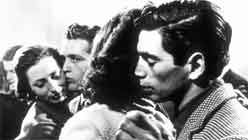How exquisitely agonizing that it’s been so hard of late to keep up with the San Francisco Film Society Cinema, whose fine programming includes rarities, recent festival highlights, and oldies-but-goodies like the Italian omnibus Love in the City, opening Friday. This particular film, from 1953, brings a special kind of repertory pleasure — not just Oh, I’ve always wanted to see that but Oh, I’ve never heard of that.
Overseen by early neorealist Cesare Zavattini, who for his part supplies a desperate saga of single-motherhood, Love in the City quilts together a handful of filmmakers’ observations on mid-century romantic attachments. In retrospect it’s also a handy primer on the attitudes and behavior of modern Italian cinema, as glimpsed in the process of formation. There are the universal truths and then there are the uniquely Italian ones.
Of course it’s easy to see any portmanteau as a mixed bag, but maybe more fun to grade internal incoherence on the curve of general accordance with the big-picture concept. Here, a few nonverbal episodes seem deceptively simple, like Dino Risi’s smoky dance hall full of fights and furtive glances, or Alberto Lattuada’s parade of pretty women and the rubbernecking men who ogle them — or, worse, cop feels on a crowded bus and degenerate into creepy lecher-zombies. Clearly these set pieces wouldn’t sustain themselves at feature length, but compilation conserves and invigorates their grace.



